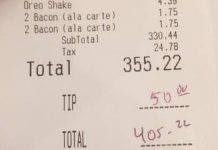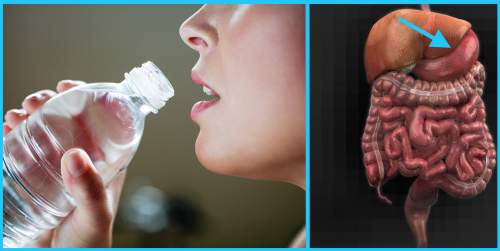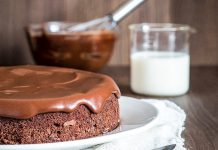You have probably often heard advice about drinking water with your meals. Over the years it has become a topic of debate, some say it’s better to drink it before meals while others believe after meals is best. To be honest, what’s most important is that you get enough water, not as much when you do it. Timing does matter, a little.
The golden rule is to maintain the ratio of 30 and 60 minutes, drinking water 30 minutes before a meal and an hour is good for digestion and overall health.
You should know that drinking water too close to eating will dilute the digestive juices. Most of us do not keep this ratio, we drink water when we are thirsty and want it. To overcome this habit we need to figure out the reasons for it.
We often see some people drinking water with meals, and doctors say that it’s fine to do, but according to yogic and Ayurvedic philosophy you should avoid drinking water during meals to avoid overloading your stomach. Half of the stomach should be filled with food, one-fourth should be filled with water, and the remainder should be empty. If you are frequently feel thirsty during your meal make it a habit to drink a full glass of water 30 minutes before eating.
Many simply cannot eat without drinking something, and it is good for cleansing your palate to take a sip now and then. Pay attention to what you are eating when making a beverage choice, if eating warm foods then hot tea or water is appropriate and not as shocking to your system as cold, and vice versa. To aid digestion consider adding fresh lemon or a splash of apple cider vinegar to your beverage.
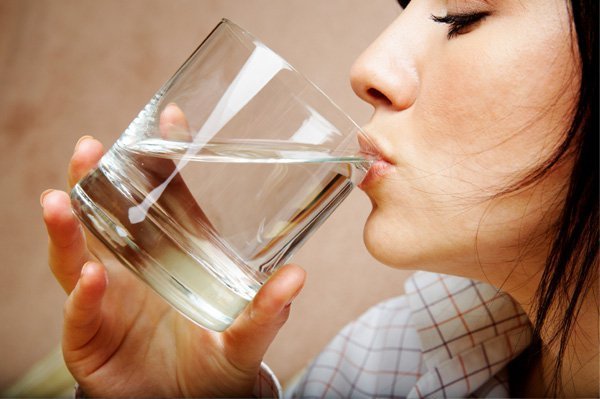
Drinking water after meals is not bad, nor does it hamper digestion, but drinking water 30 minutes before meals has better benefits.
Here are a few:
Drinking a glass of water before meals will help you achieve correct body weight and have better skin! Make it a habit and enjoy the results. Drinking water before meals helps you consume less calories which eventually results in fat loss, this is because your stomach feels full faster. As for your skin, drinking water hydrates rough, dry skin This is even more effective during the winter when your water intake is often lower.
Our body’s perform a number of processes while eating and digesting so it’s important to understand and consider each while determining if drinking water while eating is best for us.
- Our mouthes create saliva while eating as it contains digestive enzymes to help break down food. These enzymes are very important in creating a healthy digestive process.
- Our stomachs contain gastric juices that aid in digestion and are instrumental in killing any bacteria we might consume in the food we eat. It is important these juices function properly as they help break down food and allow the stomach to contract and pulverize food into a state that can be pushed to the small intestine.
- The liver is also important as once nutrients are taken from the food we eat they are sent through the bloodstream to the liver. From there, the liver distributes the nutrients to different areas of the body. It determines what to keep for later and what to utilize right away. The liver requires an ample amount of water to function and do its job properly.
To Drink or Not to Drink
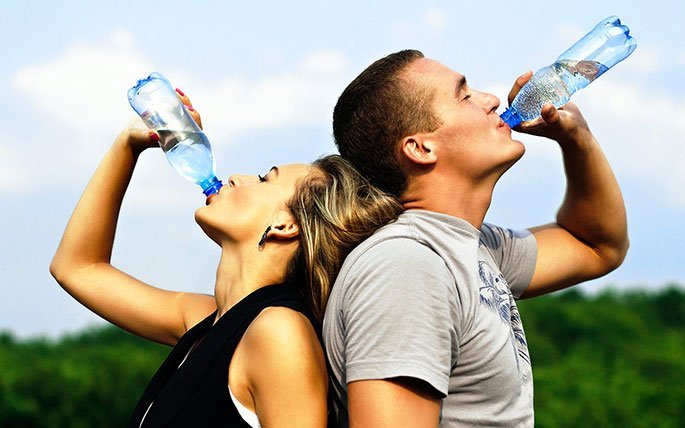
The main area of debate is whether or not drinking water during a meal is harmful or beneficial to the digestive process. There is no doubting the fact that drinking too much water during meals can interfere with the natural and necessary levels of bile and stomach acid. This would slow the digestion process and reduce the body’s ability to produce enough digestive enzymes to digest foods properly. Without proper digestion, a build up of toxic waste can occur no matter what you are eating. We can apply the same principles when thinking about other beverages we might consume during a meal. In the case of alcoholic drinks and acidic beverages like soda, they tend to dry up the saliva your glands have produced, making it even more difficult to properly digest food. Drinking water or other beverages while they are cold also slows down digestion and can create cramping in some individuals.
It is clear that drinking water before and after you eat aids the digestive process. The general consensus on this is that drinking water about 30 minutes before you eat will help keep the body hydrated which results in optimal digestion. For the liver, this is also important as overall body hydration aids in optimal liver performance. Drinking water about 30 minutes after can also assist in hydrating the body through the latter parts of digestion and replenish the lost liquids from digestion. It is important to note that drinking water during a meal would be more beneficial than not drinking while eating if you are not properly hydrated before hand. Eating while dehydrated can cause the body to have a very tough time digesting food.
The Other Side of The Coin
It’s also important to mention that according to Michael F Picco, M.D. and the MayoClinic: “There’s no concern that water will dilute the digestive juices or interfere with digestion. In fact, drinking water during or after a meal actually aids digestion. Water and other liquids help break down food so that your body can absorb the nutrients. Water also softens stools, which helps prevent constipation.” While they do not make any mention of temperature or amount of water, and don’t reference their statement, it is clear they feel drinking while eating is generally OK.
Tips
Based on the information presented, when thinking about how to approach eating meals yourself, there are several tips we can apply. It appears most beneficial to stay hydrated throughout the day and if you must drink while you eat, avoid drinking too much, as well as alcohol and acidic drinks. Drink warm water and drink it sparingly. A small glass will likely not interfere with digestion and by adding a dash of apple cider vinegar or lemon, you can aid in the digestive process further. If you can, you might want to try drinking 30 minutes before and 30 minutes after a meal with no drinking during, see how you feel. If it works for you, then stick with what works, if not, adjust accordingly. Listening to and becoming more conscious of your body and body awareness is a great step to take when thinking about new foods and how you treat your body. Sometimes going with what the body feels and wants is more important than staying rigid to information. Things change, the body changes, flow with it. Listen to your body!
Sources:
http://www.ottawawestnutrition.com/category/digestion/
http://www.mayoclinic.com/health/digestion/AN01776
http://www.uihealthcare.org/Adam/?/HIE%20Multimedia/1/001645



